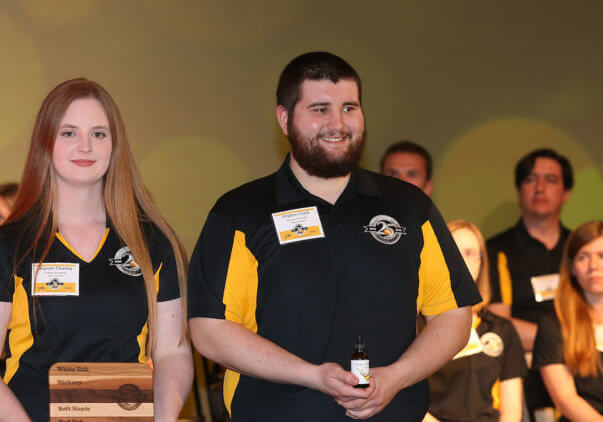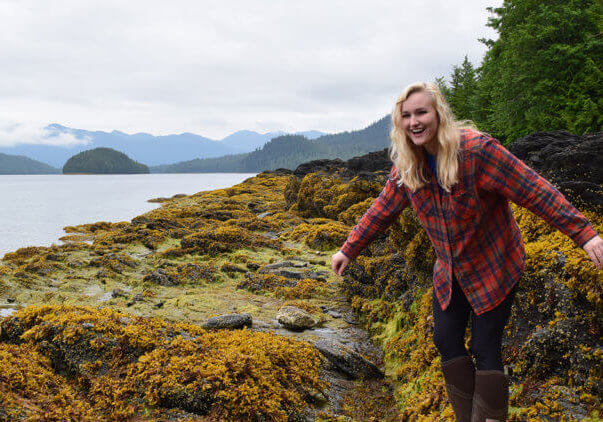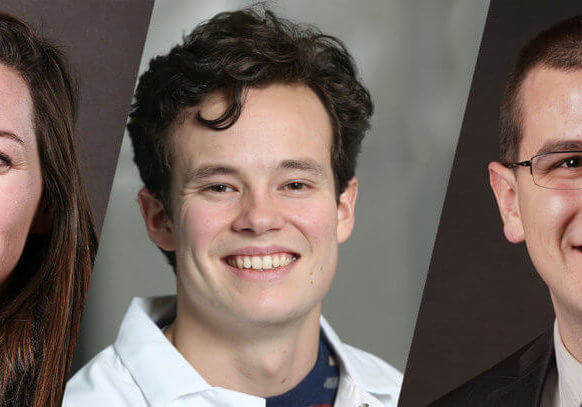T
he College of Agriculture’s outstanding student mentors and teaching assistant have one thing in common: Each benefited from impactful mentoring along their own paths to academic and personal success.
MS student Liz Alexander and PhD student Samira Fatemi are recipients of the 2020 Pathmaker Awards, sponsored by the Purdue Agricultural Alumni Association to recognize effective mentoring of undergraduate researchers-in-training and fellow graduate students. PhD candidate Jon Knott has been named the College of Agriculture’s 2020 Outstanding Teaching Assistant. Here, each award winner shares insights into the benefits of mentoring, both to their mentees and to themselves.
Liz Alexander
2020 Purdue Agriculture Graduate Student Pathmaker Award, MS level
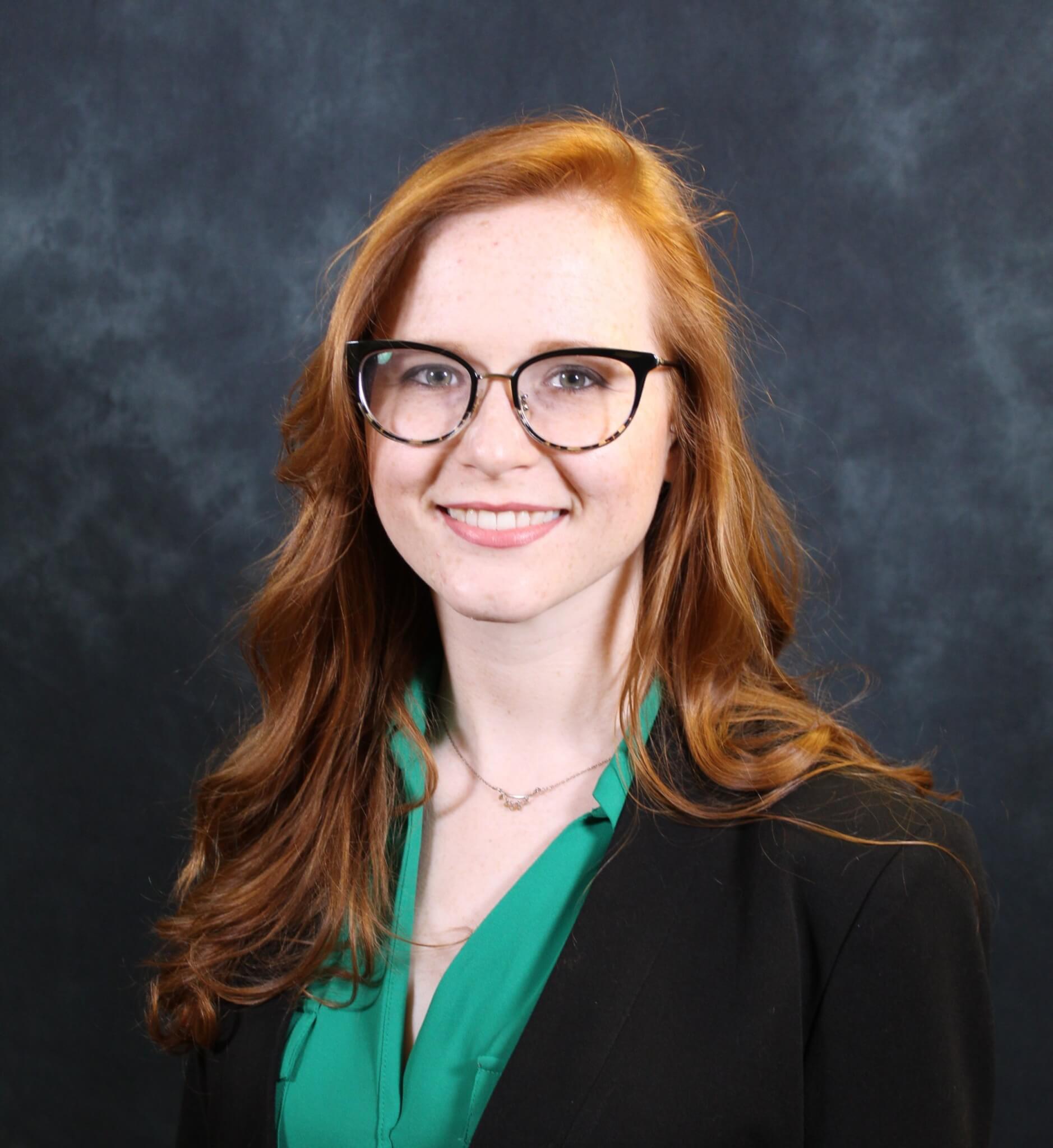
Liz Alexander is a graduating master’s student in Agricultural Sciences Education and Communication from Carmel, Indiana.
Alexander volunteered at Conner Prairie living history museum in Fishers, Indiana, from eighth grade through high school. Although the setting initially appealed to her inner “history nerd,” it also introduced her to agriculture. The late Kevyn Miller, a Purdue alumnus and Conner Prairie’s longtime livestock manager, directly influenced her decision to study animal sciences at Purdue. After earning a BS in 2016, Alexander returned to the museum as an informal agricultural educator, where she trained youth, developed STEM programming and engaged the public.
“The job allowed me to learn something new every day, get my hands dirty and work with an amazing group of people,” she says. “It made me realize I wanted to go to grad school and eventually work in Extension, making a career of solving big issues and talking to people about something I’m passionate about.” In exploring graduate programs, she credits Mark Russell, department head of agricultural science education and communication, with the same kind of proactive encouragement she found in Miller.
“I think mentoring can be an abstract concept sometimes, but these people have made a strong impression in my personal and career development,” she says.
As a master’s student under the advisorship of Levon Esters, associate professor of agricultural sciences education and communication, Alexander was logistics coordinator and a member of the Community Engagement team for an NSF grant-funded project, Modeling Agri-Life Sciences through STEM Integration (MALTS). Her team worked with an Indianapolis middle school, using urban agriculture and environmental science as context for STEM teaching.
She also coordinated the Mentoring@Purdue Invited Lecture Series and monthly on-campus workshops for faculty and graduate students in the College of Agriculture. “It was interesting to learn about mentoring from different angles,” she says.
“At the start of my graduate career, I hadn’t thought of myself as a mentor,” she adds. But the turnover and onboarding of new students over three years with the MALTS project taught her to create efficient systems that benefited each team member — and herself: “I learned just as much from my peers and from their fresh perspectives when they came in.”
Liz Alexander is a graduating master’s student in Agricultural Sciences Education and Communication from Carmel, Indiana.
Alexander volunteered at Conner Prairie living history museum in Fishers, Indiana, from eighth grade through high school. Although the setting initially appealed to her inner “history nerd,” it also introduced her to agriculture. The late Kevyn Miller, a Purdue alumnus and Conner Prairie’s longtime livestock manager, directly influenced her decision to study animal sciences at Purdue. After earning a BS in 2016, Alexander returned to the museum as an informal agricultural educator, where she trained youth, developed STEM programming and engaged the public.
“The job allowed me to learn something new every day, get my hands dirty and work with an amazing group of people,” she says. “It made me realize I wanted to go to grad school and eventually work in Extension, making a career of solving big issues and talking to people about something I’m passionate about.” In exploring graduate programs, she credits Mark Russell, department head of agricultural science education and communication, with the same kind of proactive encouragement she found in Miller.

“I think mentoring can be an abstract concept sometimes, but these people have made a strong impression in my personal and career development,” she says.
As a master’s student under the advisorship of Levon Esters, associate professor of agricultural sciences education and communication, Alexander was logistics coordinator and a member of the Community Engagement team for an NSF grant-funded project, Modeling Agri-Life Sciences through STEM Integration (MALTS). Her team worked with an Indianapolis middle school, using urban agriculture and environmental science as context for STEM teaching.
She also coordinated the Mentoring@Purdue Invited Lecture Series and monthly on-campus workshops for faculty and graduate students in the College of Agriculture. “It was interesting to learn about mentoring from different angles,” she says.
“At the start of my graduate career, I hadn’t thought of myself as a mentor,” she adds. But the turnover and onboarding of new students over three years with the MALTS project taught her to create efficient systems that benefited each team member — and herself: “I learned just as much from my peers and from their fresh perspectives when they came in.”
Samira Fatemi
2020 Purdue Agriculture Graduate Student Pathmaker Award, PhD level
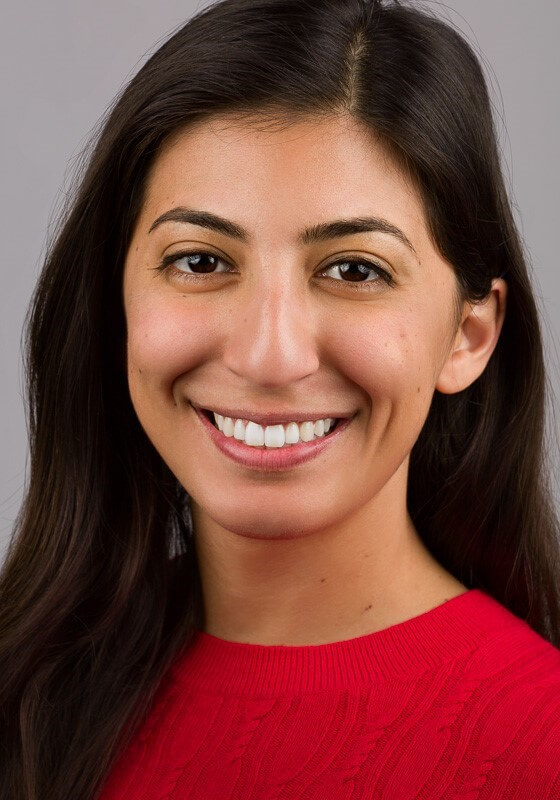
Samira Fatemi is a PhD student in Botany and Plant Pathology. She studies the role of yeasts in the microbiome of romaine lettuce in M. Catherine Aime’s lab. Fatemi holds a BS from the University of Hawaiʻi at Mānoa and an MS in biological engineering from Purdue.
She has coached undergraduate students in their research endeavors, laboratory techniques and navigating graduate school applications.
At an invited panel session on Peer Mentoring 101 as part of the Mentoring @ Purdue Program, Fatemi talked about her mentoring philosophy — mutual trust, listening, and keeping the mentee’s goals at the center of the relationship that is both interpersonal and professional.
“I’m committed to mentoring because I want to see my peers and the undergraduates I work with succeed,” she says. She cites as one such success story Rachel Scarlett, an agricultural and biological engineering PhD candidate who was recently awarded a prestigious Ford Foundation Fellowship.
“Mentoring students of color and indigenous students is of particular importance,” she adds. “I consider myself a student of color, and I’m a first-generation college student as well. Our perspectives and our experiences will be a little different. While faculty of color are often underrepresented, students of color can lean on each other for support.”
While classes met online this spring, Fatemi’s peer mentoring team kept in contact virtually, and she is quick to credit her fellow graduate students’ impact on her own career. Fatemi says her network of mentors helped inform her shift from Agricultural and Biological Engineering to Botany and Plant Pathology. “They helped me realize the things I was passionate about were the more fundamental science questions,” she explains. “They supported my changing disciplines and becoming familiar with an entirely new field.”
Fatemi cites as “strong faculty mentors” her advisor Cathie Aime, professor of botany and plant pathology; Levon Esters, associate professor of agricultural sciences education and communication; and Stephanie Masta, assistant professor of curriculum studies in the College of Education, among several others.
Fatemi may have opportunity to follow suit in her own career: “I’m hoping eventually to become faculty myself,” she says.
Samira Fatemi is a PhD student in Botany and Plant Pathology. She studies the role of yeasts in the microbiome of romaine lettuce in M. Catherine Aime’s lab. Fatemi holds a BS from the University of Hawaiʻi at Mānoa and an MS in biological engineering from Purdue.
She has coached undergraduate students in their research endeavors, laboratory techniques and navigating graduate school applications.
At an invited panel session on Peer Mentoring 101 as part of the Mentoring @ Purdue Program, Fatemi talked about her mentoring philosophy — mutual trust, listening, and keeping the mentee’s goals at the center of the relationship that is both interpersonal and professional.
“I’m committed to mentoring because I want to see my peers and the undergraduates I work with succeed,” she says. She cites as one such success story Rachel Scarlett, an agricultural and biological engineering PhD candidate who was recently awarded a prestigious Ford Foundation Fellowship.
“Mentoring students of color and indigenous students is of particular importance,” she adds. “I consider myself a student of color, and I’m a first-generation college student as well. Our perspectives and our experiences will be a little different. While faculty of color are often underrepresented, students of color can lean on each other for support.”

While classes met online this spring, Fatemi’s peer mentoring team kept in contact virtually, and she is quick to credit her fellow graduate students’ impact on her own career. Fatemi says her network of mentors helped inform her shift from Agricultural and Biological Engineering to Botany and Plant Pathology. “They helped me realize the things I was passionate about were the more fundamental science questions,” she explains. “They supported my changing disciplines and becoming familiar with an entirely new field.”
Fatemi cites as “strong faculty mentors” her advisor Cathie Aime, professor of botany and plant pathology; Levon Esters, associate professor of agricultural sciences education and communication; and Stephanie Masta, assistant professor of curriculum studies in the College of Education, among several others.
Fatemi may have opportunity to follow suit in her own career: “I’m hoping eventually to become faculty myself,” she says.
Jon Knott
2020 Outstanding Teaching Assistant
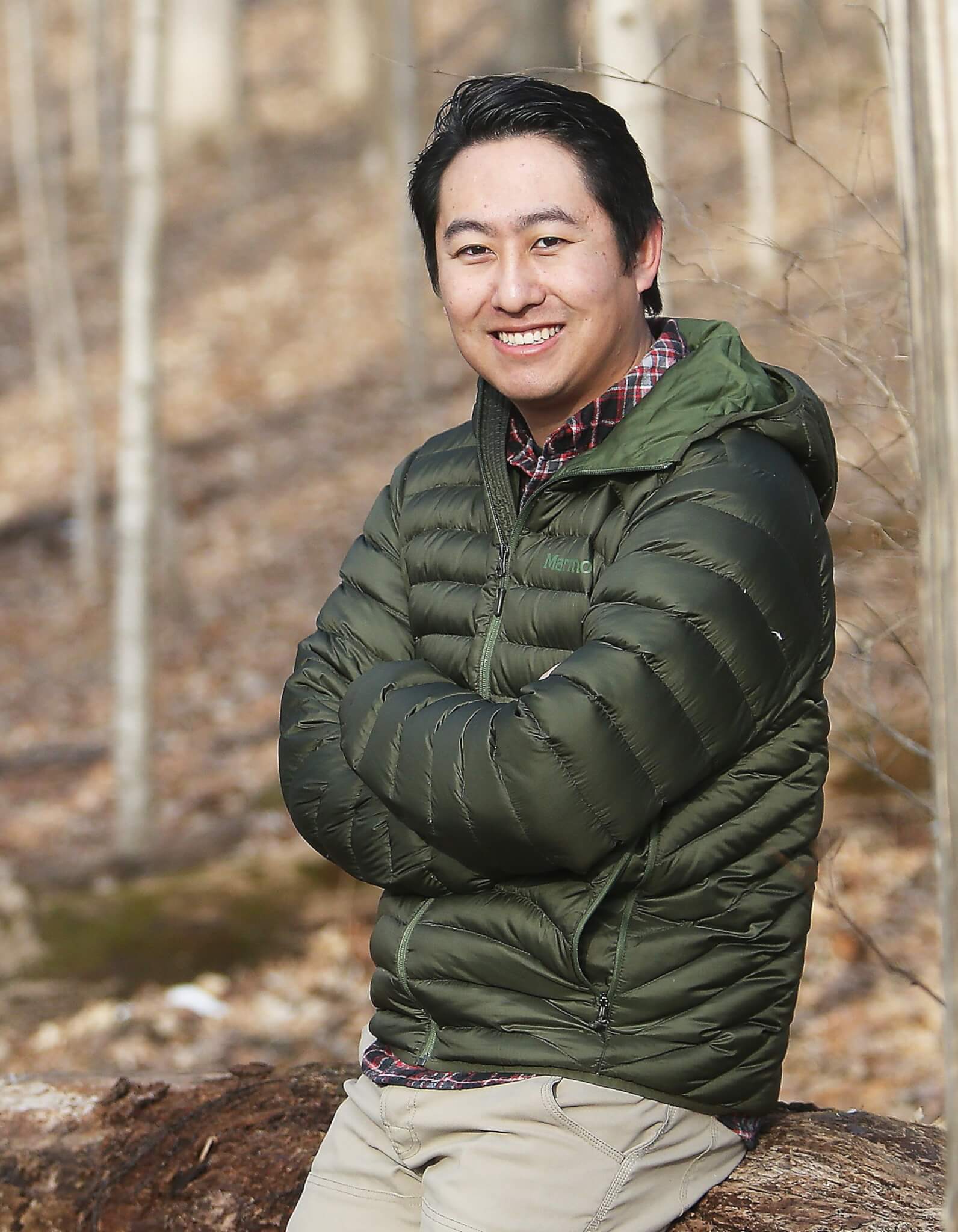
Jon Knott, a final-year PhD candidate in Forestry and Natural Resources, assessed the impact of climate change on eastern U.S. forests in the Natural Resources Spatial Analysis lab headed by Songlin Fei, associate professor of forestry and natural resources.
Knott also worked for Robert Swihart, professor of wildlife science, as a teaching assistant for the first two years of a new advanced statistics course for undergraduates and for a graduate-level applied statistics course last fall.
As an undergraduate at Calvin University, Knott was part of a faculty-student team that redesigned the laboratory section for the Department of Biology’s introductory ecology and evolution course. The experience taught him the value of hands-on activities — “trying to get students engaged with the material in a real research type of way.” He applied that to his students at Purdue.
He also followed good advice from his wife, an elementary school teacher. “She’s taught me that building relationships with your classes is important to an effective teaching environment,” he says. “I tried to be approachable so students can come for help and I can work with them to figure out what they really need.”
The unique opportunity to TA the first two years of the new undergraduate course was particularly interesting to Knott: “It was really cool to learn how you can take what you learn in the first year and use it to improve the course in the second.”
He also helped design and teach short courses on R, one of the top statistical programs in ecology and natural resources, and Leximancer, a program that identifies concepts and topics within text data. “R is a coding language, so it has a bit of a learning curve,” he explains. “We wanted to give people an introduction to it in preparation for other courses.”
Knott has moved on to postdoc at Michigan State University but thinks his Purdue experience will benefit him no matter where his career takes him. “If I pursue academia, being a TA will be extreme helpful for future teaching,” he says. “Even for nonacademic positions, I’ll carry my mentoring skills with me wherever I go.”
Jon Knott, a final-year PhD candidate in Forestry and Natural Resources, assessed the impact of climate change on eastern U.S. forests in the Natural Resources Spatial Analysis lab headed by Songlin Fei, associate professor of forestry and natural resources.
Knott also worked for Robert Swihart, professor of wildlife science, as a teaching assistant for the first two years of a new advanced statistics course for undergraduates and for a graduate-level applied statistics course last fall.
As an undergraduate at Calvin University, Knott was part of a faculty-student team that redesigned the laboratory section for the Department of Biology’s introductory ecology and evolution course. The experience taught him the value of hands-on activities — “trying to get students engaged with the material in a real research type of way.” He applied that to his students at Purdue.
He also followed good advice from his wife, an elementary school teacher. “She’s taught me that building relationships with your classes is important to an effective teaching environment,” he says. “I tried to be approachable so students can come for help and I can work with them to figure out what they really need.”

The unique opportunity to TA the first two years of the new undergraduate course was particularly interesting to Knott: “It was really cool to learn how you can take what you learn in the first year and use it to improve the course in the second.”
He also helped design and teach short courses on R, one of the top statistical programs in ecology and natural resources, and Leximancer, a program that identifies concepts and topics within text data. “R is a coding language, so it has a bit of a learning curve,” he explains. “We wanted to give people an introduction to it in preparation for other courses.”
Knott has moved on to postdoc at Michigan State University but thinks his Purdue experience will benefit him no matter where his career takes him. “If I pursue academia, being a TA will be extreme helpful for future teaching,” he says. “Even for nonacademic positions, I’ll carry my mentoring skills with me wherever I go.”
Soy-based herbicide takes top honors
Let’s do that again!” thought Alyson Chaney and Peyton Clark as they stood on stage holding a $10,000 check. On March 27, 2019, after a challenging eight-month competition hosted by the Indiana Soybean Alliance, the pair was already planning their next moves.
Read Full Story >>>Wildlife and forestry student branches out
Rachel Brummet’s passion for forestry and wildlife led her to Alaskan islands, wildfires in Montana, city streets where she used pyrotechnics to help people and wildlife coexist, and, of course, to Purdue’s forestry and natural resources department.
And it all began with a discussion about blueberries.
Read Full Story >>>Award winners credit college’s contributions
Since 2003, 14 of the 36 G.A. Ross and Flora Roberts Award winners have been from the College of Agriculture. Justin Couetil, a biochemistry student, won the G.A. Ross Award in 2019. Cameron Mann won the Flora Roberts Award in 2017, representing agricultural communication and agribusiness.
Read Full Story >>>Soy-based herbicide takes top honors
Let’s do that again!” thought Alyson Chaney and Peyton Clark as they stood on stage holding a $10,000 check. On March 27, 2019, after a challenging eight-month competition hosted by the Indiana Soybean Alliance, the pair was already planning their next moves.
Read Full Story >>>Wildlife and forestry student branches out
Rachel Brummet’s passion for forestry and wildlife led her to Alaskan islands, wildfires in Montana, city streets where she used pyrotechnics to help people and wildlife coexist, and, of course, to Purdue’s forestry and natural resources department.
And it all began with a discussion about blueberries.
Read Full Story >>>Award winners credit college’s contributions
Since 2003, 14 of the 36 G.A. Ross and Flora Roberts Award winners have been from the College of Agriculture. Justin Couetil, a biochemistry student, won the G.A. Ross Award in 2019. Cameron Mann won the Flora Roberts Award in 2017, representing agricultural communication and agribusiness.
Read Full Story >>>